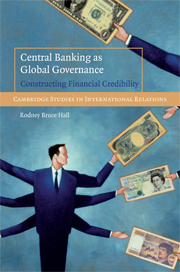Book contents
- Frontmatter
- Contents
- Preface
- 1 Central banking as governance
- 2 The social character of money
- 3 Instituting facts and constituting rules
- 4 Constitutive power relations
- 5 Rules and international monetary systems
- 6 Central bank independence as credibility
- 7 Transparency and intersubjectivity in central banking
- Bibliography
- Index
- Cambridge Studies in International Relations
- References
3 - Instituting facts and constituting rules
Published online by Cambridge University Press: 03 May 2010
- Frontmatter
- Contents
- Preface
- 1 Central banking as governance
- 2 The social character of money
- 3 Instituting facts and constituting rules
- 4 Constitutive power relations
- 5 Rules and international monetary systems
- 6 Central bank independence as credibility
- 7 Transparency and intersubjectivity in central banking
- Bibliography
- Index
- Cambridge Studies in International Relations
- References
Summary
Economists typically believe in models. This methodological approach can be useful for lots of purposes, but… I am not trying to construct a model; I am trying to advance a theory that states an important set of facts about how society actually works.
John R. Searle“Now, what I want is, Facts. Teach these boys and girls nothing but Facts. Facts alone are wanted in life. Plant nothing else, and root out everything else. You can only form the minds of reasoning animals upon Facts: nothing else will ever be of any service to them…Stick to Facts, sir!”
Mr. Thomas Gradgrind, in Charles Dickens's Hard TimesThe scientific study of social phenomena must, as we would expect with all scientific endeavors, concern itself with the explication, stipulation, and explanation of facts. To apprehend social reality, just as with physical reality, we want to concern ourselves with facts. Economists concern themselves with a plethora of facts and they have devised numerous metrics to render these facts in a measurable form. Economic concepts such as gross domestic product, the capital account deficit, the exchange rate between currencies, and the non-accelerating inflation rate of unemployment (NAIRU) are all considered by economists to be measurable facts that can be assigned a quantitative value. But these facts all have something in common. They are a special form of fact that we may call an “institutional fact.” The economic realm is, as is the social realm, not predominantly concerned with material facts, but with institutional facts.
- Type
- Chapter
- Information
- Central Banking as Global GovernanceConstructing Financial Credibility, pp. 45 - 83Publisher: Cambridge University PressPrint publication year: 2008



